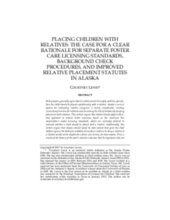Abstract
Policymakers generally agree that if a child cannot live safely with her parents, then the child should be placed expeditiously with a relative. Alaska’s current system for evaluating relative caregivers is overly complicated, creating unnecessary barriers for relatives and increasing the risk of mistakenly denying placement with relatives. This Article argues that Alaska should adopt a threestep approach to achieve better outcomes based on the American Bar Association’s model licensing standards, which are narrowly tailored to evaluate whether a child should be placed with a relative. Additionally, this Article argues that Alaska should repeal its state statute that gives the child welfare agency the ability to establish prima facie evidence to deny a relative if a relative would not be eligible for a foster care license, for two reasons. First, a review of the history of the state’s statutes indicates that the legislature did not ntend to provide the Department of Health and Human Services with the current definition of prima facie evidence. Second, Alaska’s current statute is not compliant with the 2016 federal regulations regarding the Indian Child Welfare Act. Lastly, this Article argues that Alaska should adopt a statute clearly delineating the court’s authority to order placement of a child facing foster care with a relative to expedite compliance with relative placement in frontline child welfare practice. Adopting these proposals would reduce barriers and the number of mistakes in frontline child welfare practice, which would increase both the timeliness and the number of children placed with relatives.

